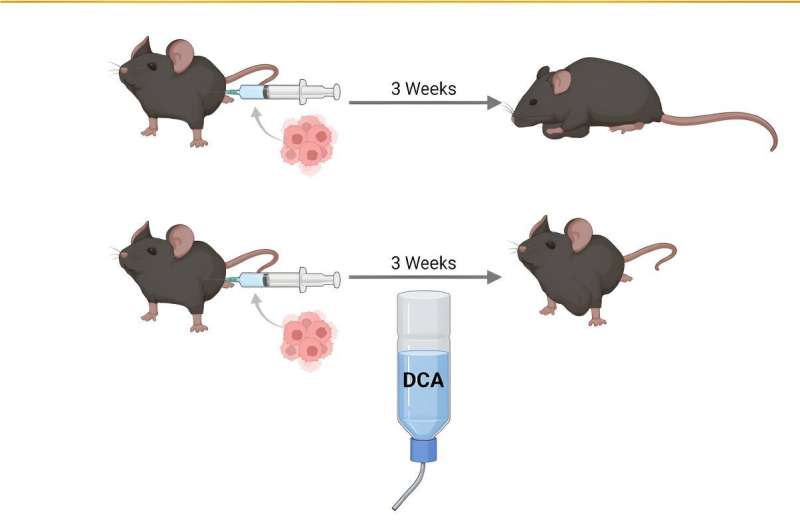This article has been reviewed according to Science X's editorial process and policies. Editors have highlighted the following attributes while ensuring the content's credibility:
fact-checked
trusted source
proofread
Team reports on promising treatment for cancer-related fatigue

Cancer-related fatigue (CRF) is a debilitating yet all-too-common condition, which can severely affect quality of life for patients undergoing treatment. For those struggling with CRF, there have been no effective pharmaceutical treatments for the constellation of symptoms that together define the syndrome.
In a new study led by Yale Cancer Center researchers at Yale School of Medicine, the team found that a metabolism-targeting drug called dichloroacetate (DCA) helped alleviate CRF in mice, without interfering with cancer treatments. The findings are a pathway for future CRF research that may someday lead to a new therapy for patients.
The results were published in American Journal of Physiology-Endocrinology and Metabolism on Oct. 2.
"This study identifies dichloroacetate, an activator of glucose oxidation, as the first intervention, and particularly the first metabolism-focused intervention, to prevent the whole syndrome of cancer-related fatigue in preclinical models," said senior author Rachel Perry, who is a member of Yale Cancer Center.
Researchers used tumor-bearing mouse models to investigate the effectiveness of DCA in treating cancer-related fatigue for patients living with melanoma. The group found that DCA did not affect the rates of tumor growth or compromise the effectiveness of immunotherapy or chemotherapy in two mouse cancer models. DCA also significantly preserved physical function and motivation in mice with late-stage tumors.
The data suggests that DCA treatment may have several positive effects, including reducing oxidative stress in muscle tissue of tumor-bearing mice. The researchers said DCA could be a practice-changing approach in the future, when used as an adjuvant therapy to treat cancer-related fatigue.
"We hope that this research will provide the bedrock for future clinical trials using dichloroacetate—an FDA-approved drug for another indication (lactic acidosis)—to treat the debilitating syndrome of cancer-related fatigue," said Perry, who is also an assistant professor of medicine (endocrinology) and of cellular and molecular physiology at Yale School of Medicine.
Perry was joined by Yale first author Xinyi Zhang.
More information: Xinyi Zhang et al, Dichloroacetate as a novel pharmaceutical treatment for cancer-related fatigue in melanoma, American Journal of Physiology-Endocrinology and Metabolism (2023). DOI: 10.1152/ajpendo.00105.2023


















